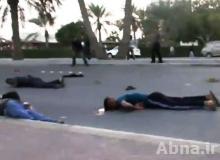(Ahlul Bayt News Agency) - Bahraini rights activists have launched a campaign urging South Korea to cancel an imminent shipment of over 1.6 million tear gas canisters reportedly ordered by the Saudi-backed Manama regime engaged in the suppression of the two-and-a-half-year-long uprising.
Bahraini rights activists have launched a campaign urging South Korea to cancel an imminent shipment of over 1.6 million tear gas canisters reportedly ordered by the Saudi-backed Manama regime engaged in the suppression of the two-and-a-half-year-long uprising.
A document dated June 16, 2013 obtained this week by the Bahrain Watch monitoring group allegedly shows that al-Khalifa regime’s interior ministry has requested an order of 1.6 million tear gas shells, 145,000 stun and flash grenades, and 90,000 tear gas grenades, Al-Akhbar reported Friday.
The huge quantity of riot police gear for suppression of protest rallies has startled human rights observers who pointed out that the size of the order was larger than the entire 1.2 million population of Bahrain, half of which is comprised of foreigners and migrant workers not involved in the largely-peaceful, anti-government movement.
"I think if you look at the scale and frequency of the use of tear gas in Bahrain, it's unprecedented anywhere in the world," Alaa Shehabi, a founding member of Bahrain Watch which is behind the so-called Stop the Shipment campaign.
"They (police) are using hundreds of rounds on a nightly basis, ... so they need this amount to sustain the constant state of repression."
Shehabi added that her group has received information that the order is expected to be delivered before the end of this month.
"We've had, in the last 24 hours since we launched the campaign, 11,000 e-mails sent to Korean agencies involved in shipment," Shehabi said.
Heeding the activists’ efforts against the order, the Korean Confederation of Trade Unions has condemned the tear gas deal and urged authorities in Seoul to halt the shipment, citing humanitarian concerns.
The procurement tender does not specify the supplier of the weapons, but activists say that the bulk of the tear gas that reaches the tiny Persian Gulf island is manufactured by two South Korean companies and a joint German-South African one.
Rheinmetall Denel Munition, a German-South African company, and South Korea's Defense Acquisition Program Administration both refused to speak about the alleged deal.
Police have killed at least 89 people since the anti-government uprising erupted in February 2011, according to the Bahrain Center for Human Rights. Of those victims, 39 died from tear-gas related attacks including suffocation and direct shots to the head, records from Physicians for Human Rights show.
Authorities have so far been unable to quell the nearly daily demonstrations that persist across Bahraini villages against the widely-detested, US-backed monarchy. Dozens of human rights activists, doctors and political opponents have been jailed since the start of the uprising.
Over the past month alone, Bahrain sentenced 104 protest leaders to prison terms of up to 15 years on alleged "terrorism" charges.
/129
Bahraini rights activists have launched a campaign urging South Korea to cancel an imminent shipment of over 1.6 million tear gas canisters reportedly ordered by the Saudi-backed Manama regime engaged in the suppression of the two-and-a-half-year-long uprising.
A document dated June 16, 2013 obtained this week by the Bahrain Watch monitoring group allegedly shows that al-Khalifa regime’s interior ministry has requested an order of 1.6 million tear gas shells, 145,000 stun and flash grenades, and 90,000 tear gas grenades, Al-Akhbar reported Friday.
The huge quantity of riot police gear for suppression of protest rallies has startled human rights observers who pointed out that the size of the order was larger than the entire 1.2 million population of Bahrain, half of which is comprised of foreigners and migrant workers not involved in the largely-peaceful, anti-government movement.
"I think if you look at the scale and frequency of the use of tear gas in Bahrain, it's unprecedented anywhere in the world," Alaa Shehabi, a founding member of Bahrain Watch which is behind the so-called Stop the Shipment campaign.
"They (police) are using hundreds of rounds on a nightly basis, ... so they need this amount to sustain the constant state of repression."
Shehabi added that her group has received information that the order is expected to be delivered before the end of this month.
"We've had, in the last 24 hours since we launched the campaign, 11,000 e-mails sent to Korean agencies involved in shipment," Shehabi said.
Heeding the activists’ efforts against the order, the Korean Confederation of Trade Unions has condemned the tear gas deal and urged authorities in Seoul to halt the shipment, citing humanitarian concerns.
The procurement tender does not specify the supplier of the weapons, but activists say that the bulk of the tear gas that reaches the tiny Persian Gulf island is manufactured by two South Korean companies and a joint German-South African one.
Rheinmetall Denel Munition, a German-South African company, and South Korea's Defense Acquisition Program Administration both refused to speak about the alleged deal.
Police have killed at least 89 people since the anti-government uprising erupted in February 2011, according to the Bahrain Center for Human Rights. Of those victims, 39 died from tear-gas related attacks including suffocation and direct shots to the head, records from Physicians for Human Rights show.
Authorities have so far been unable to quell the nearly daily demonstrations that persist across Bahraini villages against the widely-detested, US-backed monarchy. Dozens of human rights activists, doctors and political opponents have been jailed since the start of the uprising.
Over the past month alone, Bahrain sentenced 104 protest leaders to prison terms of up to 15 years on alleged "terrorism" charges.
/129

